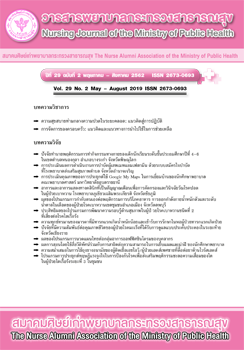Family Management: Concept and Implementation Guidelines to Help Families of Children with Chronic Illness
Main Article Content
Abstract
Chronic illness is a health problem that needs continual care. Nowadays, the number of children with chronic illness is increasing. Chronic conditions have impacts on children and their families. Families play an important role in the care of their children during their illness. However, families differ in their ability for care of their children during their illness. If the family is not able to manage problems, it will affect the quality of care for their sick children. The Family Management Framework describes family management styles and purposes to assist family members to effectively manage their children with chronic conditions. The purpose of this article is to present the Family Management Framework and how health care providers, especially nurses, can apply this framework to help the families appropriately manage chronic conditions of the children, in the context of each family, for the improvement of quality of life.
Article Details
บทความและรายงานวิจัยในวารสารพยาบาลกระทรวงสาธารณสุข เป็นความคิดเห็นของ ผู้เขียน มิใช่ของคณะผู้จัดทำ และมิใช่ความรับผิดชอบของสมาคมศิษย์เก่าพยาบาลกระทรวงสาธารณสุข ซึ่งสามารถนำไปอ้างอิงได้
References
2. Bureau of Non communicable disease. Annual Report 2017 Bureau of Non communicable Disease [internet]. 2018 [cite 2018 Mar 21]. Available from http://thaincd.com/2016/media-detail. php?id=12986&gid=1-015-008
3. Diabetes Association of Thailand. Diabetes statistics of Thailand [internet]. 2017. [cite 2018 June 10]. Available from http://iregist.igenco.co.th/web/dmthai_old/news_and_knowledge/list/3?page=7
4. Thai Health Promotion Foundation. 5 types of cancer in children [internet]. 2016. [cite 2016 October 20]. Available from http://www.thaihealth.or.th/content/28040-81.html
5. World Health Organization. Non communicable diseases [internet]. 2014 [cite 2018 Mar 21]. Available from http://www.who.int/nmh/publications/ncd-status-report-2014/en/
6. Barbara L, Janet A. Health care autonomy in children with chronic conditions: Implications for self-care and family management. Nurs Clin North Am 2014; 48(2): 305-317.
7. Areegamlert N, Wichiencharoen K, Sriussadaporn P, Piboonpocaun O. Caregiver management of asthma triggers within the home environment. J Nurs Sci 2010; 28(4): 76–85. (in Thai).
8. Kuttasang R. Effect of family management promotion program on maternal management and health status of school age children with thalassemia. Faculty of Nursing [Master thesis]. Chonburi: Burapha
University.2016. (in Thai).
9. Pongsing Y. Family management style framework: a concept to help families of children with chronic condition. Journal of Boromarajonani College of Nursing, Bangkok 2011; 27(1). 1-8. (in Thai).
10. Sananreangsak S. Development of a family management program for school-aged children with Thalassemia. Unpublished Doctoral dissertation, Public Health Nursing, Faculty of graduate studies [Master thesis]. Bangkok: Mahidol University. 2011. (in Thai).
11. Nookong A. The effect of a home environmental management program for children with asthma on caregivers’ management behavior. J Nurs Sci 2011; 29(3): 94-102. (in Thai).
12. Knafl K, Deatrick J, Havill N. Continued development of the family management style framework. Journal of Family Nursing 2012; 18(1): 11-34.
13. Thongsamrit N, Chandarasiri P. Psychosocial status among mother of children with chronic lung disease. Chula Med J 2016; 60(5): 575-788. (in Thai).
14. Watthanachai P. Asthma severity, family management behavior and asthma symptom control in children among family caregivers. Nursing journal 2016; 43(2). 1-12. (in Thai).
15. Knafl K, Deatrick J. Further refinement of the family management style framework. Journal of Family Nursing 2003; 9(3): 232-256.
16. Gallo A, Knafl K, Angst D. Information management in families who have a child with a genetic condition. J Pediatric Nurs 2009; 24(3): 194-204. doi:10.1016/j.pedn.2008.07.010.
17. Susan K. Clinical application of family management style to family of children with cancer. Journal of Pediatric Oncology Nursing 2006; 23(1): 28-31.
18. Mendes-Castillo AMC, Bousso RS, Faria-lchikawa CR, Silva LR. The use of the family management style framework to evaluate the family management of liver transplantation in adolescence. Rev Esc Enferm USP 2014; 48(3): 430-7.
19. Knafl K, Deatrick J, Gallo A, Dixon J, Grey M, Knafl G, Malley J. Description of the Family Management Measure (FaMM) [internet]. 2007. [cite 2018 Mar 21]. Available from http://www.Ohsu.edu/son/famm.
20. Knafl K, Deatrick J, Gallo A, Dixon J, Grey M, Knafl G, Malley J. Assessment of the psychometrics of the family management measure. Journal of Pediatric Psychology 2011; 36(5): 494-505.
21. Knafl K, Deatrick J, Knafl G, Gallo A, Grey M, Dixon J. Pattern of family management of children chronic condition and their relationship to child and family functioning. J Pediatric Nurse 2013; 28(6). 523-535.
22. Riper M, Knafl G, Roscigni C, Knafl K. Family management of childhood chronic condition: Does it make a difference if the child has an intellectual disability. American Journal of Medical genetics 2018; 82-91. doi: 10.1002/ajmg.a.38508.
23. Sananreangsak S, Lapvongwatana P, Virutsetazin K, Vatanasomboon P, Gaylord N. Predictors of family management behavior for children with thalassemia. Southeast Asian J Trop Med Public Health 2012; 43(1): 160-172. (in Thai).

